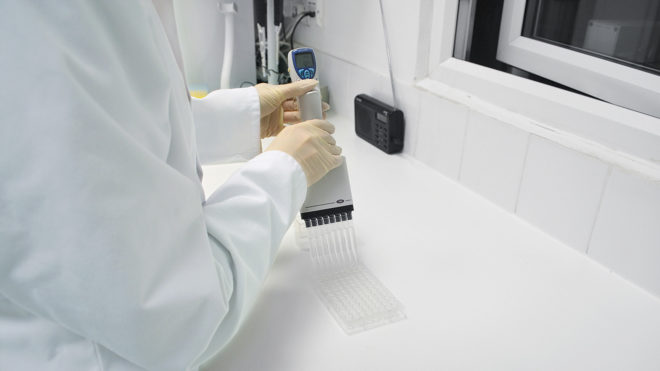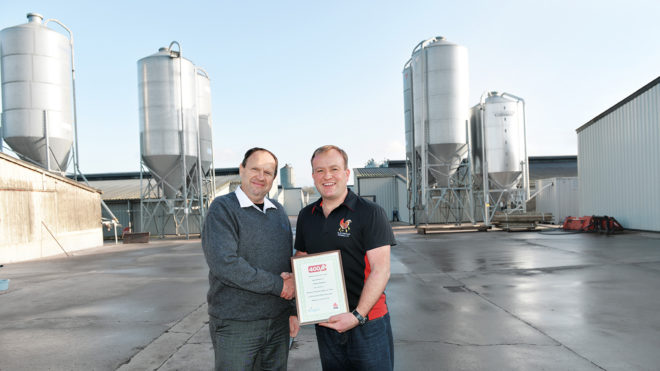The media love a good scare story, but the figures behind antimicrobial resistance are truly worrying. Already, at least 700,000 people die around the world each year as a result of drug resistance: At this rate, it will cause 10 million deaths a year by 2050, with many arising from simple infections following routine operations.
These figures form part of the independent global Review on Antimicrobial Resistance, chaired by Jim O’Neill and published in May 2016. Commissioned by the British government in July 2014, the review engaged widely with international stakeholders to understand and propose solutions to antimicrobial resistance.
One part of the 10-point plan is to reduce the amount of antibiotics used in global livestock production. Although some have questioned the link between antibiotic use in animals and resistant microbial strains in humans, there is no escaping public pressure to reduce antibiotic use in agriculture.
According to the Responsible Use of Medicines in Agriculture Alliance (RUMA), which has set up a task force to help achieve sector-specific targets, about 35% of the UK’s antibiotic sales go to livestock farming. That is half the level seen in the US. And a recent review of several Northern European studies suggested that farm animal use could be responsible for just one in 370 human cases of resistant bacteria.
In 2019 the British government published a five-year strategy to reduce antibiotic use in farm animals by 25% between 2016 and 2020. That is quite a demand. But it’s not impossible, as the poultry sector is already starting to prove.

Good bio-security and hygiene are key to reducing disease risks.
ANTIBIOTIC STEWARDSHIP WORKS
In 2011 the British Poultry Council launched an antibiotic stewardship scheme, bringing together expertise from leading poultry veterinarians and producers. In just five years BPC members slashed their antibiotic usage by 82%, even though poultry production increased by more than 5% over the same period.
The industry has also voluntarily withdrawn certain categories of antibiotics which are critically important to human medicine, and it became the first sector to publish and review medicine usage. Since then, other sectors have followed suit, with more than 5m pigs now registered on an industry database to record antibiotic use, and a cattle initiative also under way. There are clearly massive differences in antibiotic usage in livestock across the world, as well varying levels of understanding among the general public. Indeed, some believe antibiotics and hormones are still used as growth promoters in the EU, even though they were banned in 2006 and 1988, respectively.
But that’s not to say we can’t learn from industry best practice around the globe. And that’s something that St David’s Poultry Team, based in Devon, has done. Its new approach to reduce antibiotic use; created by a group of scientists, vets and primary producers, has proven such a success that it is now being rolled out across much of the country.
A HUGE CHALLENGE
“Producing top quality, high welfare chicken at consumer-friendly prices without antibiotics is a huge challenge,” says partner Richard Turner. “That is why we have focussed so much on developing a robust system that farmers can adopt. There will always be situations where we have to treat with antibiotics, but there hasn’t been enough time spent looking at alternative approaches.”

Richard Turner
St David’s developed the ABC concept – which stands for Applied Bacterial Control – to improve bird health through bespoke husbandry solutions for each farm, alongside the use of products like fatty acids, essential oils and probiotics.
In 2016, the team organised an international conference – Antibiotic Reduction: The Next Step – which brought together key experts on human and animal medicine. Speaking at the event, Professor Colin Hill from University College Cork, Ireland, explained that chickens – and humans – are actually 90% microbes and only 10% chicken or human cells. “Everyone has a different microbiome, assembled from their parents, their environment, their food – there are over 1000 species and they play a key role in health,” he said.
Beneficial bacteria help to out-compete pathogens, and a core principal of the ABC approach is Seed, Weed and Feed, developed by Professor Stephen Collett from the University of Georgia, America. “You need to seed the gut with favourable flora, feed the favourable flora, and weed out the unfavourable microbes,” he says. For best results, ABC should be adopted at every stage of the supply chain, from breeder to finisher, to cultivate beneficial bacteria and progressively eliminate the damaging ones.
There will always be situations where we have to treat with antibiotics, but there hasn’t been enough time spent looking at alternative approaches.
Richard Turner
In poultry production, the birds face a number of challenges over a short period of time, from vaccinations to dietary changes. Any such stress can have a negative impact on intestinal health, resulting in diarrhoea and potential infection. Often, in these cases, vets turn to antibiotic treatments. The aim of the ABC approach is to overcome these challenges through improved natural immunity and optimum gut development at an early stage.
TAKING AN HOLISTIC APPROACH
St David’s approach is a very holistic one, starting with the parent stock and chick environment, and encompassing water cleanliness and pH, and overall bio-security. It also uses products like Intesti-Flora – a mix of short chain fatty acids, prebiotics and oligosaccharides – as well as bacteria like Lactobacillus farciminis (Biacton) to help to develop the correct gut environment.
In America, many farmers are already rearing chickens without any antibiotic usage at all, according to Dr Linnea Newman from Merck USA. “Restaurant chains and wholesalers have begun a drive for antibiotic free production,” she explains. One firm – Perdue, is sharing its formula for success. “The Perdue programme is to reuse poultry litter – the organism is the house and you want it to be a like a yoghurt culture,” says Dr Newman. “Antibiotic-free production forces us into good management, and as a result performance is often better.”
Antibiotic-free production forces us into good management, and as a result performance is often better.
Dr Linnea Newman
In the UK, farmers cannot reuse poultry litter – after each flock the house is completely cleaned and disinfected to reduce the potential transfer of disease. However, that never gets rid of the bacteria in a house completely, says Prof Collett. “The balance of good and bad bacteria remains the same, albeit at reduced levels – it takes about seven cycles to displace the unfavourable flora compared to three cycles in deep litter.”
Professor Richard Ducatelle from Ghent University, Belgium, reckons the shift from trying to eliminate microbes to cultivating beneficial ones is a step-change for the industry. “To me, this is the future of the veterinary profession.”
LEARNING LESSONS ACROSS SECTORS
Having proven the approach works in the poultry sector, St David’s is now turning its attention to the pig industry, which has many similarities. “Beneficial bacteria pass down from one generation to the next, so if you have healthy sows their piglets get a head start in life,” says Mr Turner.
“However, weaning and a change in diet adversely affects the piglets’ gut, potentially resulting in gastric ulcers and slow growth rates.” Treatment with antibiotics is routine at this time, but this kills off many of the beneficial bacteria, resulting in a dysfunctional gut and impacting productivity.
Every farm is different and requires a bespoke approach, but reducing the routine use of antibiotics need not be feared.
Richard Turner
The answer lies in boosting and protecting the animals’ natural bacteria and health, removing the necessity for routine antibiotic use. “It’s vital that we keep the efficacy of antibiotics to treat animals and humans when they are ill,” warns Mr Turner. “Every farm is different and requires a bespoke approach, but reducing the routine use of antibiotics need not be feared.”
CASE STUDY
Charlie Simpson rears 542,000 broilers per crop at Lower Heath Farm, Whitchurch, Shropshire, and has slashed his antibiotic usage by 70-80% in the first three years of adopting the ABC approach. When he started working with St David’s vet Suzy Ackerley, Mr Simpson decided to trial a range of essential oils at about three weeks of age to support the birds’ intestinal health. These help to stabilise the intestine and reduce leakage of bacteria into the bloodstream.
“At this time the birds are undergoing a feed change, being vaccinated against Gumboro disease and also going through their optimum growth phase,” says Miss Ackerley. “This combination means intestinal health can suffer; the essential oils help to support the birds during this critical period.”
Mr Simpson trialled it on six of the 15 computer-controlled houses and the performance benefits mean he’s now rolled it out across the whole site. “If you can get the birds off to a good start it’s a great help,” he says. “The stronger and healthier they are the better.” Mr Simpson uses an LMS automated dosing system to improve water sanitisation and add acids to optimise intestinal health. “Hygiene is very important, but water hygiene is often overlooked,” he says. He also adds probiotics and protected butyric acid to the feed whenever a flock starts to look as if it’s running into health problems.
The industry is pushing for a reduction in antibiotic usage and we’re keen to get on with it. It’s all about prevention rather than cure.
Charlie Simpson
General shed hygiene is of course vital, as is using the best quality feed. “It’s really a combination of everything pulling together,” says Mr Simpson. “There’s no doubt that the industry is pushing for a reduction in antibiotic usage and we’re keen to get on with it. It’s all about prevention rather than cure.”
Having made the changes, Mr Simpson became the largest farmer ever to join Aviagen’s coveted “400 Club” which recognises the highest performing broiler producers in the country. Taking into account feed conversion, mortality and daily liveweight gain, his European Production Efficiency Factor averaged 403 across all 15 houses. “It’s been a long time coming – I’m just very proud to have got there.”
ABOUT ANTIBIOTIC RESISTANCE

- Antibiotic resistance is a naturally occurring process – but increased use raises the risk of resistance.
- If the world fails to act, resistance will cost over US $100tn in lost output.
- Increasing international travel means strong global co-ordination is required.
- Requires a multi-disciplined approach.
10-POINT PLAN
- Public awareness
- Sanitation and hygiene
- Antibiotics in agriculture
- Vaccines and alternatives
- Surveillance
- Rapid diagnostics
- Human capital
- Drugs
- Global innovation fund
- International coalition for action


